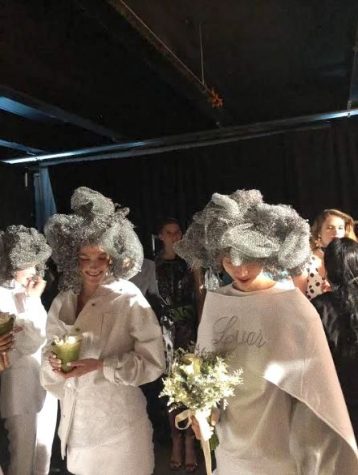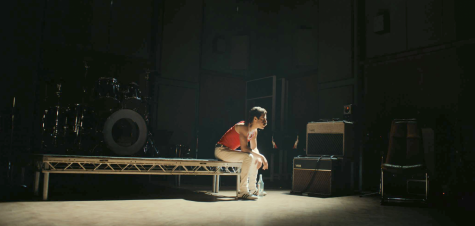Season 2 of Jessica Jones Underperforms
Carrie-Anne Moss plays Jeri Hogarth on Netflix's "Jessica Jones" (C-Jones-Flickr).
March 21, 2018
Filed under Culture, Film and Television
Hang on for a minute...we're trying to find some more stories you might like.
Email This Story

Carrie-Anne Moss plays Jeri Hogarth on Netflix’s “Jessica Jones” (C-Jones-Flickr).
By Briana Scalia
The second season of “Jessica Jones,” while not unwatchable, is certainly not as enjoyable as its initial season. The most recent of Marvel’s batch of Netflix shows, “Jessica Jones” defines the feminist superhero. And while I still found myself anticipating each episode, it lacks both the breakneck pace and the brutal messages of the first season.
To start with the positives, the acting is as superb as ever. Krysten Ritter plays the show’s protagonist and super-heroine with ease, transitioning from Jones’ witty one-liners to emotionally impacting dialogue with other characters. Jones’ is not a simple character, and she is not played nor written as one. Audiences cannot help but feel for the titular character, even though she is not the most likable of people.
Others worth mentioning include Rachael Taylor, playing Patricia “Trish” Walker. Over the course of the season, Walker undergoes a tragic yet organic arc dealing with her past drug addiction, leading her to make decisions she might not have in the first season. Though many viewers found this arc to make the character unlikeable, I would argue that this is exactly the point of the arc.
People that suffer from addiction, especially an addiction to a harmful substance like drugs, often do not act like themselves while under the influence, or even when they are undergoing withdrawal. That Rachael Taylor was willing to take her character to this point of unlikeability is amazing and should be commended. Eka Darville, playing Jones’ assistant Malcolm, also has an interesting arc of self-realization. After being used by both Jones’ and Walker throughout the season, he ends his arc realizing his true worth.
However, the true standout of the season was Carrie-Anne Moss, playing cutthroat lawyer Jeri Hogarth. Rather than abandon the character to the show’s overlapping plot lines, Moss takes advantage of her character’s powerful narrative of trying to overcome sickness and proves that her character is integral to the show.
The overall themes of the season can be boiled down to the relationships we have with others and how we often take advantage of those relationships. Characters use other characters to further their goals, with little concern for where it leaves the other. Malcolm uses Jones’ as a distraction for his addictive behavior, Walker uses Malcolm to further her career goals and the toxic cycle continues on.
Unfortunately, the latter theme does not resonate quite as strongly as the first.
Season one of the show had a blunt, brutal message concerning rape, specifically rapists themselves. After overcoming that demon last season, “Jessica Jones” now chooses to focus on the relationships between parents and their children, or in Jones’ case the relationship between mother and daughter. Janet McTeer does a wonderful job playing Alisa Jones, Jessica’s biological mother. McTeer and Ritter have great chemistry, and the show really picks up once the plot shifts focus towards Alisa.
However, several times in the show main and side characters alike impart the idea that one should do their best to maintain a relationship with their parents, no matter how they have behaved or treated their children. Phrases like “you only get one mother” are tossed around carelessly between scenes of Alisa acting truly selfish.
This is a huge missed opportunity for the writers to explore the relationship between abusive parents and their children, specifically how children can overcome these relationships by seeking out other role models. Rather than insisting that toxic relationships should be salvaged, shows like “Jessica Jones” should instead focus on the importance of chosen family.
Another major flaw of this season was the pacing. Season one had the audience on the edge of their seat, theorizing about the mysteries the show presented while fearing the next appearance of Purple Man, one of Marvel’s most menacing antagonists. Before the appearance of Jones’ mother, the pace of this season was incredibly slow, and the first five episodes sometimes felt like a chore to watch. Characters were strolling through their plots, almost waiting for their individual catalysts.
I also can not help but note the lack of reference to the formation of the Defenders team. Dearest Marvel, if you want crossovers in all of your platforms, you have to be prepared to address those crossovers in later seasons. You can not have your cake and eat it too.
These issues, while not groundbreaking, are just simply disappointing, especially when compared to season one of “Jessica Jones”. Hopefully next season will feature a stronger antagonist, a clearer message and a return to revealing brutal truths.













If you want a picture to show with your comment, go get a gravatar.